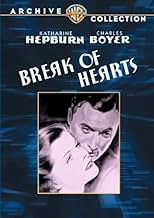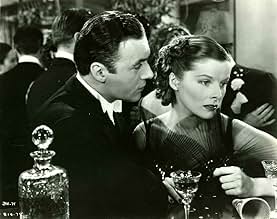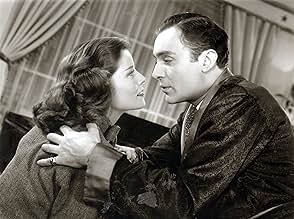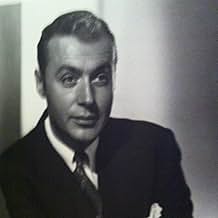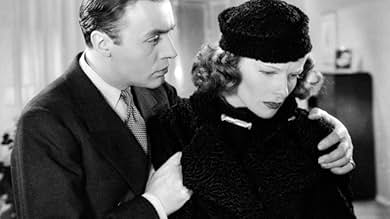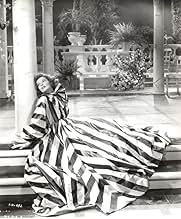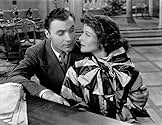Aggiungi una trama nella tua linguaFranz Roberti, orchestra conductor with multiple girlfriends, meets aspiring composer Constance through Professor Thalma. They marry, honeymoon across Europe, but Constance leaves after find... Leggi tuttoFranz Roberti, orchestra conductor with multiple girlfriends, meets aspiring composer Constance through Professor Thalma. They marry, honeymoon across Europe, but Constance leaves after finding Franz with a divorcee.Franz Roberti, orchestra conductor with multiple girlfriends, meets aspiring composer Constance through Professor Thalma. They marry, honeymoon across Europe, but Constance leaves after finding Franz with a divorcee.
- Regia
- Sceneggiatura
- Star
- Premi
- 4 vittorie totali
- Albert Henderson
- (non citato nei titoli originali)
- Messenger
- (non citato nei titoli originali)
- Man in Hotel
- (non citato nei titoli originali)
- Max
- (non citato nei titoli originali)
- Radio Announcer
- (non citato nei titoli originali)
- Mr. Lubin
- (non citato nei titoli originali)
Recensioni in evidenza
This is all about Boyer and Hepburn. They have a bit of chemistry but I wouldn't call it heated. They are a bit too cerebral. They need a better meet-cute to start off the movie. The relationship is at medium simmer rather than maximum heat. The movie can't elevate that high even with the drama. Nothing is that in doubt. The hurdles aren't that high. It simmers but it never boils.
World famous conductor and womanizer Franz Roberti drops by an old friend's and meets Constance Dane a music teacher and aspirant composer. He's pleasant to her but no more. When she can't get a ticket to his sold out show she sneaks into a rehearsal and creates a scene that first annoys and then charms Roberti. They go out and Roberti lays out his Casanova MO to her but much to his surprise finds himself falling in love and marrying her. They globe trot on their honeymoon and all is well until she discovers he has returned to his old ways and decides to leave him. Crestfallen they almost reconcile but she rejects him and he takes to drink sabotaging his career.
The early scenes between the pair falling in love has a charming energy as Boyer's dark eyed intensity and magnificent inflection charm Hepburn's bedazzled beauty. But once the honeymoon ends and Constance books the film descends into a mawkish affair it can't climb out of with both leads becoming a touch too strident.
Philip Moeller's direction is flat and uninspired as he relies heavily on Hepburn close-ups and Boyer's roving eye to make his point. Advancing the story choppily and with little form in the process the glossy sets and lavish costumes lack the sweep they deserve with Moeller's camera movements tentative at best.
The most ironic moment in the film is when Hepburn launches into discourse on how she will look out for the sodden Roberti eerily reflecting her relationship with Spence a decade away.
Lederer (born Frantisek or Franz Lederer in Prague) was a handsome leading man-type actor who developed into a matinee idol in European films just before his arrival in the US in 1932. Although darkly attractive and warmly regarded by the critics, American audiences seemed not to be positively responding to him. RKO's strategy in 1935 was to cast Hepburn and Lederer together in a film with the hope that this combination would prove to generate a hit for both of them. The project was to be named Break of Hearts (BOH) and would be directed by Philip Moeller of the Theatre Guild. Then RKO started to film the picture. Trouble began shortly thereafter.
It turned out that Lederer was a temperamental and insecure actor, who initiated a quarrel with Moeller because he felt that the director was tilting BOH more in favor of Hepburn's character. During the second week of filming, Lederer walked off the set, and did not return. A desperate RKO sought out Charles Boyer to fill the void based upon his recent success in the film Private Worlds----and fill it he did. Hepburn and Boyer became a congenial acting couple and BOH was smoothly finished without further complications.
However, BOH did not meet box office expectations. Critics felt that Moeller was a static film director, and Hepburn's role of a long suffering serious composer providing endless support for a hedonistic symphony conductor left much to be desired as entertainment. BOH reinforced Boyer's growing reputation in Hollywood as an appealing Continental lover-type character who also had depth and conviction as an actor. Unfortunately, BOH's tepid box office results continued to complicate Hepburn's marketability and reinforced the impression that she seemed to have problems selling herself as a commercially viable artist.
BOH contained fine acting performances from its two principals and had an intelligent (if somewhat overwrought) script. However, the Boyer character was hard to like, and Hepburn's commitment to him grew tiresome to the film's audiences. In the end, their fans were underwhelmed. Hepburn made a modest comeback in her next film (Alice Adams (1935)), but continued on a mercurial career trajectory that was a feature of her work in the 1930s. She could not then realize that her best years were still ahead of her.
Lo sapevi?
- QuizAmong the many women whose photos adorn Franz Roberti's apartment is a very blonde Lucille Ball, who was an RKO Radio contract player at the time this film was made.
- Citazioni
Franz Roberti: I feel better.
Constance Dane Roberti: Did you feel badly?
Franz Roberti: You don't have to feel bad to feel better.
- ConnessioniReferences La moglie è un'altra cosa (1934)
- Colonne sonoreSymphony No. 9 in E minor 'From the New World'
(1893) (uncredited)
Written by Antonín Dvorák
Excerpts played at a concert
I più visti
Dettagli
- Data di uscita
- Paese di origine
- Lingue
- Celebre anche come
- Corazones rotos
- Luoghi delle riprese
- Azienda produttrice
- Vedi altri crediti dell’azienda su IMDbPro
Botteghino
- Budget
- 427.000 USD (previsto)
- Tempo di esecuzione1 ora 18 minuti
- Colore
- Proporzioni
- 1.37 : 1
Contribuisci a questa pagina


